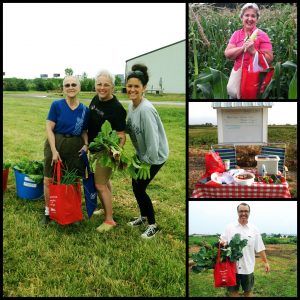A garden that provides cancer survivors with fresh produce enables greater intake of fruits and vegetables, along with improved quality of life, suggests the findings a new study.
The results of this ongoing study were presented as a poster this week at AICR’s research conference – findings have not yet gone through the peer-reviewed publishing process.
The study was based on Ohio State University’s (OSU) Garden of Hope, a garden designed in collaboration with OSU’s agricultural research center.
Partnering with the James Cancer Hospital, patients and survivors receive education and remote health coaching about healthy eating that aligns with AICR’s Recommendations. Dietetic interns from OSU help the survivors harvest produce and answer questions about healthy preparation, food safety and dietary guidelines.
Since 2013, the “Growing Hope” studies have investigated the effects of gardening on various groups of cancer survivors every year.
The study’s principal investigator is Steven K. Clinton, MD, PhD, and Colleen Spees, PhD, MEd, RDN.
“Cancer survivors are at risk for poor nutrition due to therapy, inadequate dietary patterns and susceptibility to unproven dietary advice,” says Spees. “One objective of our interventions is to establish a dietary pattern built upon the foundation of improved fruit and vegetable intake.”
Conducted over the 6-month growing season, the study measured blood and skin tests to measure pre- and post-intervention concentrations of plant compounds called carotenoids. The 29 overweight, adult participants also filled out food frequency questionnaires that covered additional areas in the AICR recommendations, such as limiting red meat and sugary drinks.
Over the course of the study, participants increased their vegetable consumption by more than 1 serving a day and their fruit consumption by more than 1/2 serving a day. Their carotenoid levels increased and participants reported improved mental and physical health. “Through the garden intervention, we aim to foster improved eating patterns to last a lifetime for cancer survivors so they can improve outcomes, avoid recurrence and enjoy a better quality of life,” says Dr. Clinton. “Eventually, we would like to replicate the entire curriculum, including educational sessions focusing on the AICR Recommendations, so this effort can serve as a model for other cancer centers across the nation.”






Recently diagnosed and trying to learn healthy foods and eating habits and all I can about cancer. Thanks, Michelle!
Hi Michelle, Here’s a resource we have that might help: CancerResource, it has eating and exercise information for those diagnosed: http://www.aicr.org/patients-survivors/cancerresource/cancerresource-intro.html